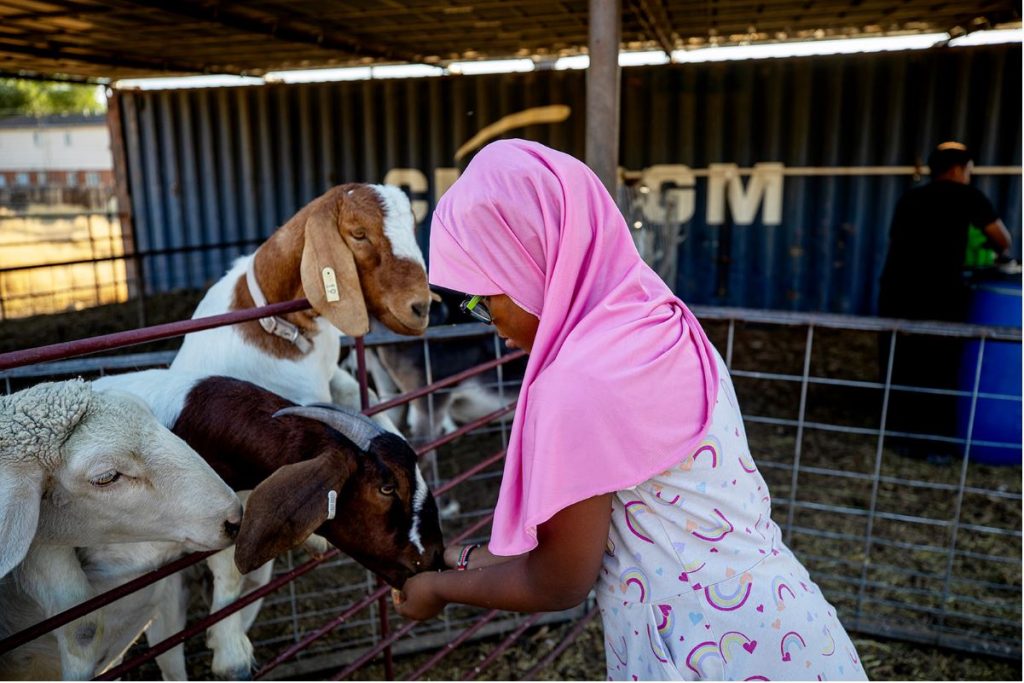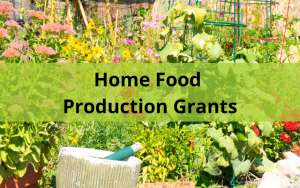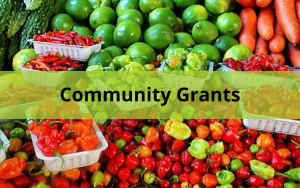
Learn more about the 2025 Community Food Grant recipients here.
About the program:
The SLC Food Microgrant Program is a funding opportunity to support resident- and community-led projects that address food systems disparities and increase access to fresh, healthy, affordable, and culturally relevant food in Salt Lake City.
The purpose of the SLC Food Microgrant Program is to build an inclusive community around healthy food choices where Salt Lake City residents have many opportunities to shape, participate in, and enjoy a sustainable, equitable, and resilient local food environment.
The SLC Food Microgrant Program is available to Salt Lake City residents and community-based organizations that primarily serve in Salt Lake City. There are two categories of funding:
- Home Food Production Grants: $250 for residents
- Community Grants: up to $5,000 for community groups, organizations, or small businesses
The Salt Lake City Sustainability Department created the SLC Community Food Microgrant Program in 2023 and has distributed over $75,000 in funding support to more than 100 residents and community groups over the past two years. See below for more information on community grant awardees and their projects.
Community Food Microgrant goals:
By providing funds to start or continue projects that improve food access in Salt Lake City, the SLC Food Microgrant aims to achieve the following broad goals:
- Foster resilient, diverse, and inclusive healthy neighborhood food environments.
- Support multiple pathways for traditionally marginalized individuals and neighborhoods to consistently access and grow fresh, affordable, healthy, and culturally relevant food.
- Enhance community and individual agency and self-reliance by reducing barriers and creating opportunities for people to access what they need to grow and prepare their own food.
- Increase the availability and accessibility of food information and resources.
- Create opportunities for residents to affordably and easily acquire food that is relevant to cultural and personal identity, individual health and wellbeing, religious and spiritual life, and personal taste.
Questions?
Contact the Food Systems Outreach Coordinator, Leesie Clegg:
email – leesie.clegg@slc.gov | phone/text – (385) 707-7582


Currently closed The Home Food Production Grant provides $250 for residents to grow or raise their own food. Funds can be used to buy supplies or access education opportunities for starting, continuing, or expanding a food garden or other home food production project such as hoop houses, backyard chickens, composting, fruit tree maintenance, or beekeeping.Home Food Production Grant
Currently closed Community Grants provide up to $5,000 for community groups, organizations, or small businesses to advance projects that improve food access in Salt Lake City. Funds can be used to purchase equipment and supplies, access educational opportunities, or support personnel compensation directly related to the proposed project. Community Grant
2025 Awardees
In 2025, ninety-six (96) individual residents or households were awarded $250 each to support their own home food production efforts such as vegetable and herb gardens, fruit trees, food preservation, backyard chickens, and beekeeping.
Additionally, Community Grants were awarded to twelve (12) community groups engaged in projects that address one or more of the grant priority categories: growing food, inclusive outreach, dignified food access, and healthy food environments. Click here for a list of Community Grant recipients and a brief description of what they each used the funding for.
2024 Awardees
In 2024, sixty-two (62) individual residents or households were awarded $250 each to support their own home food production efforts such as vegetable and herb gardens, fruit trees, food preservation, backyard chickens, and beekeeping.
Additionally, Community Grants were awarded to ten (10) community groups engaged in projects that address one or more of the grant priority categories: growing food, inclusive outreach, dignified food access, and healthy food environments. Click here for a list of Community Grant recipients and a brief description of what they each used the funding for.
2023 Awardees
In 2023, forty-five (45) individual residents or households each received $250 Home Food Production Grants, and thirteen organizations received Community Grants. Click here for a list of the 2023 Community Grant recipients and a brief description of what they each used the funding for.
Frequently Asked Questions
Who can apply for an SLC Food Microgrant?
SLC Food Microgrants are available to the individuals and groups listed below. Only one application will be accepted per household or organization.
- Salt Lake City residents
- Community-based organizations, including both registered 501(c)(3) non-profit organizations or unregistered community groups based in or serving Salt Lake City
- Community Councils and other neighborhood-based groups and organizations
- Locally owned businesses, social enterprises, and/or cooperative enterprises
- Local farmers and others who grow and sell food locally
The following groups are NOT eligible to receive a grant.
- Government agencies
- Political groups
- Media groups
- Organizations or businesses located or serving outside of Salt Lake City
To check if you or your organization are located within Salt Lake City’s boundaries, please check here: https://www.slc.gov/council/about-us/district-map/
This program aims to support projects led by and benefiting people and communities that have been negatively impacted by the food system or that experience barriers to accessing the foods they need. Identifying with one or more of these groups is not required to receive funding. These groups include but are not limited to:
- Black, Indigenous, and People of Color
- People living in historically marginalized or under-resourced neighborhoods
- People and households living in poverty or with low- or moderate-incomes
- Unsheltered or informally housed people
- LGBTQIA2S+ individuals
- People with disabilities
- Veterans
- Adults 65+ years old
- Families with children under 18 years of age
- Single parent households with children
- Nontraditional students
- New Americans
- Formerly incarcerated people
- Groups for whom funding opportunities are or historically have been limited
What kinds of projects are eligible for funding?
Any food related projects that connect with the purpose and goals of this grant will be considered for funding. All projects must comply with relevant City, County, and State regulations.
Community Grant projects that align with the key ideas and recommendations outlined in the SLC Resident Food Equity Advisors’ Final Report (June 2021) will be prioritized for funding. The four main categories of prioritized projects include:
- Growing Food – Projects that support opportunities and access to growing food locally.
- Project examples: urban agriculture projects, community gardens, home gardening, backyard chicken keeping, beekeeping, neighborhood orchards, greenhouses, fruit-gleaning projects, garden education, indoor/vertical farming initiatives, composting.
- **Note that new community garden projects will not be considered on public property. Please work through the City’s Green City Growers Program if you are interested in proposing a new community garden.
- **Note that fruit trees planted in park strips require a permit from SLC Urban Forestry.
- Inclusive Outreach & Communications – Projects that support accessibility of information about food resources to groups that experience challenges with traditional informational outlets.
- Dignified Food Access – Projects that support improving access to healthy and relevant food opportunities that center and respect the agency and choice of individuals.
- Project examples: client choice food pantries, culturally appropriate food pantries, mobile pantries or food delivery projects, food or cash vouchers, neighborhood micro-pantries, mutual-aid model food sharing projects.
- Healthy Food Environments – Projects that support the availability and accessibility of healthy, fresh foods and enhance the quality and character of the food environments near where people live.
- Project examples: healthy corner stores, fresh food carts, community markets, healthy food incentive programs, direct market outlets (farmers markets, farm stands, CSAs), fresh food delivery programs, streetscape or building improvements around local markets.
See a list of community projects funded in the past here: 2024 Community Grants | 2023 Community Grants.
What can grant money be used for? Is there anything it can’t be used for?
Approved uses of funds include:
- Project equipment and supplies
- Educational opportunities
- Professional services or personnel compensation directly related to the project
Funds are not to be used for the following:
- Personal use (rent, groceries, or other living/business expenses)
- Political activities (lobbying or campaigning)
Where can projects be? Do I have to own my house to qualify?
Projects must be located in Salt Lake City. See a map of the SLC boundaries here: https://www.slc.gov/council/about-us/district-map/
Projects may take place on either public or private property and can be at a home, community garden plot, neighborhood space, or community organization site. Either proof of ownership or permission from the property owner may be required before projects are approved for funding. Projects proposed on public lands may require additional documentation and permitting.
Are there requirements for the grant recipients?
Yes. Grant recipients will be asked to do the following:
- Sign an agreement with the City outlining the responsibilities, expectations, and requirements of receiving funding.
- Register with the City by submitting a W9 form to receive the funding. This may have tax reporting implications.
- Attend an orientation event (optional for Home Food Production Grant Recipients).
- Report outcomes of the funded project, including photos, to the Sustainability Department.
How do I apply for a grant?
Applications are available and accepted in multiple formats including: an online or paper form; a phone call; video chat; in-person meeting; or an audio or video recording. Applications must address all the required questions in the form (linked on this webpage) to be considered complete.
- Written Options: online form, digital form (Word document or fillable pdf), or paper form
- Digital forms should be submitted by email to the Program Manager.
- Paper applications should be sent or delivered to the following address: Sustainability Department, Food Microgrant Program, 451 South State Street, Room #418, Salt Lake City, Utah, 84114.
- Paper applications may also be dropped off at any of the SLC Library branches.
- Recorded Options: an audio or video recording responding to the application questions.
- Recorded responses should be submitted by email to the Program Manager.
- Live Exchange Options: phone call, video chat, or in-person meeting with the Program Manager
- To schedule a live exchange application appointment, contact the Program Manager.
Applications are available and accepted in any language. Application forms in a language other than Spanish or English are available upon request.
If you need help accessing the grant application or would like to request the application information in a different format or language, please contact the Program Manager, Maria Schwarz: email: maria.schwarz@slc.gov | phone/text: (385) 271-7220
The 2025 SLC Food Microgrant application period will be open until March 3rd, 12:00 PM (noon). Applications submitted after this date will not be considered for funding.
I was awarded a Food Microgrant before. Can I apply again?
Yes! Awardees from the 2023 and 2024 SLC Food Microgrant Program are eligible to apply for funding through the SLC Food Microgrant Program in 2025. Please note that priority may be given to new applicants.
I’ve never applied for a grant before, can I get help with the application?
Yes! You can attend an information session and workshop (register here), stop by our drop-in office hours on Tuesdays from 2:00 – 6:00 PM at the City & County Building, Room 418, to meet with the Program Manager, or contact the Program Manager directly for individual help with your project idea or grant application.
Program Manager: Maria Schwarz – email: maria.schwarz@slc.gov | phone/text: (385) 271-7220
How will projects be selected for funding?
A Selection Committee of city employees and community representatives will review, score, and recommend applicants for funding. To better understand the scoring criteria for applications and guidelines to create a strong application, you can view the rubrics the committee uses when reviewing applications.
When will the grant recipients be announced?
Grant recipients will be selected and notified in early April.
When will I get the money, if I am selected for funding?
Funds will be distributed upon notification of selection for funding. Selected projects will need to sign an agreement contract and register for payment with the City via a W9 form prior to receiving their funds.
All funds must be distributed before June 1.
How will I get the money, if I am selected for funding?
Home Food Production Grants will be sent to the recipient via check.
Community Grant recipients have three options available to receive funding:
- Direct check: Funds can be provided via check to an organization or project leader.
- Reimbursement: Grant recipients may request reimbursement for purchases made for services and supplies used for their project.
- Direct purchases: The Salt Lake City Sustainability team may be able to purchase needed supplies or services for the project up to the total awarded amount.
Why does this grant program exist?
Nearly 1-in-4 (21%) Salt Lake City residents struggle to buy food, and more than 1-in-3 (41%) residents are not able to access the types of food they prefer to eat, especially healthy foods, culturally relevant foods, or medically needed foods. Food insecurity is not spread evenly among Salt Lake City residents. Native American, Pacific Islander, Black, and Hispanic residents, residents with less educational attainment, renters, and people with disabilities are more likely on average to experience food hardship. (Salt Lake City Resident Food Access Survey, 2022).
Responding to these facts and to the lived experience shared by those who have experienced food hardship, the Resident Food Equity Advisors recommended the SLC Food Microgrant Program as a way to improve food access in Salt Lake City. The program is an example of the overall effort by the Sustainability Department to shift the way policy and programs are developed and delivered to emphasize community-driven approaches where solutions to challenges are co-developed with our communities and residents. Our goal is to advance solutions that reflect the local knowledge, lived experience, and diverse priorities of residents and organizations whose lives have been negatively impacted by the food system by providing funding to support new and existing food related projects.
Salt Lake City is committed to acknowledging and addressing historic and current disparities experienced by our residents, employees, businesses, neighborhoods, and visitors. By providing access to resources and opportunities, we aim to support everyone in overcoming barriers so that our community today, and generations tomorrow, can thrive. We are committed to making sure both the process and outcomes of this program are fair and meet our community’s needs. We welcome feedback about ways to make this grant accessible to more people or community groups. If you have questions or suggestions about our work in Salt Lake City’s food system, please contact the Program Manager.
If you have a question that is not answered above, please contact the Food System Resilience Program Manager, Maria Schwarz by email – maria.schwarz@slc.gov or by phone/text – (385) 271-7220